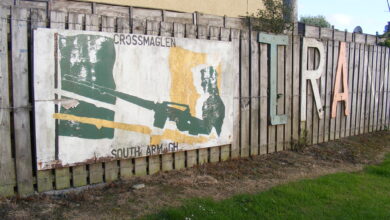Liam Clarke: Adams peggior risorsa dello Sinn Fein
Liam Clarke: Adams is Sinn Fein’s worst asset
If the party is to gain the Dail seats it wants, it is going to have achieve a clean brake from its IRA past
 When Frank Flannery, Fine Gael’s director of elections, suggested that his party could contemplate coalition with Sinn Fein but for the “matter of a private army”, there was a predictable furore from Fianna Fail and other parties.
When Frank Flannery, Fine Gael’s director of elections, suggested that his party could contemplate coalition with Sinn Fein but for the “matter of a private army”, there was a predictable furore from Fianna Fail and other parties.
In the middle of a difficult European and local elections campaign, the overture was a welcome diversion for Fianna Fail. Even so, Dermot Ahern should have resisted the temptation to denounce the suggestion as “stomach churning” and demand Flannery’s resignation.
The “stomach churning” soundbite was an unfortunate echo of John Major’s assertion that talking to Sinn Fein would “turn his stomach”, even as the prime minister was in secret negotiations with them. The outrage was doubly unfortunate in view of the fact that, in October 2004, Ahern went even further than Flannery in flirting with Sinn Fein. “Obviously if circumstances change, our view in relation to Sinn Fein going into government will change,” he said at Hillsborough Castle, appealing for IRA decommissioning. “There will come a time, I envisage, when Sinn Fein will be in government in the Republic as they will be in the north and I hope that happens in the future.”
Both Fine Gael and Fianna Fail emerged from the IRA. Both parties realise that present-day Sinn Fein could make the same transition. At present, though, supping with Sinn Fein is high-risk and requires a long spoon. It’s one thing to have a compulsory coalition as the price of peace in Northern Ireland, but a voluntary deal in the Republic would be another matter.
 The obvious difficulty is that a scandal involving the Shinners would be unlikely to stop at brown envelopes. It could include secretly buried bodies, money laundering and pay-offs from foreign terrorist groups. A coalition deal with Sinn Fein would be particularly risky while people like Gerry Adams, Martin McGuinness and Martin Ferris remain at the top table. Their involvement in republicanism during its most violent phase has left them with a lot of personal baggage. How can they convincingly distance themselves from anything nasty that emerges from the IRA woodwork?
The obvious difficulty is that a scandal involving the Shinners would be unlikely to stop at brown envelopes. It could include secretly buried bodies, money laundering and pay-offs from foreign terrorist groups. A coalition deal with Sinn Fein would be particularly risky while people like Gerry Adams, Martin McGuinness and Martin Ferris remain at the top table. Their involvement in republicanism during its most violent phase has left them with a lot of personal baggage. How can they convincingly distance themselves from anything nasty that emerges from the IRA woodwork?
Meanwhile Adams still can’t resist embroidering a story. Much of what he says is for effect; he doesn’t stick to the literal truth. This potential for inaccuracy has serious political implications for any politician seeking to do business with Sinn Fein.
Consider the interview Adams gave to David Norris on Newstalk last Sunday. Asked about his favourite songs, he didn’t mention republican ballads or Christy Moore as he sought to create a softer image. He mentioned You are my Sunshine, and Always Look on the Bright Side of Life, from Monty Python’s Life of Brian. This was sung in the film by three unfortunates being crucified by the Romans, and Adams wanted to tap the image of resilience and humour in the face of oppression.
“I remember that being sung in prison,” he said. “When I was in prison, after a very, very brutal incursion into the prison wing and the prison officers beat everybody and the wing was deadly silent and then from way down the wing we heard this little voice going Always Look on the Bright Side of Life. Then within about five minutes there were about 100 men playing that at the top of their voices.”
Savour that golden moment. IRA prisoners, badly beaten but reacting cheerfully, without rancour, in the face of brutality. It’s an iconic image that Adams conjured up to illustrate his positive outlook. The problem is that he conjured it up out of nowhere; it’s a fabrication. We know this because Adams got out of prison in 1978 and the song wasn’t released until August 1979. Unless the Monty Python team stole the lyrics from IRA prisoners, Adams couldn’t have heard it sung in jail.
Rusty Nail, a blogger, has tracked down the likely origins of the story to a similar anecdote Adams related in his autobiography, Before the Dawn, published in 1996. But there are significant differences. In the original account Adams writes: “One memorable night on the anniversary of internment there was a great session on our wing that went on until the early hours of the morning.” Prison staff were lining up in riot gear to restore order when a little voice came from the back singing On the One Road, a ballad of republican solidarity. The prison officers, instead of beating the inmates, conducted a head count and let the party continue.
Who knows if this is true either? Are both stories like Adams’ continued denial of IRA membership, even though he was released early from jail to join an IRA negotiating team in the 1970s?
If Adams had retired from active politics, it wouldn’t much matter if he told tall tales about life behind bars. Chutzpah and flannel can be endearing in the context of fireside reminiscences. Politics are another matter. If you can’t resist the temptation to rewrite history to your advantage, any coalition partner would be a fool to trust your word.
Sinn Fein got a taste of that when Bertie Ahern, as taoiseach, angrily denounced the party’s leadership for treating the Irish government “like eejits” in their blanket denials of IRA involvement in the Northern Bank robbery and other crimes.
Democratic politics is a cruel trade. Support is fickle — a leader who loses his touch or gathers too much historical baggage is dumped. Those who have served their purpose can be sent sliding down the greasy poll if they don’t have the sense to jump first.
 Last year Ian Paisley timed his departure right and got the gold-watch treatment as soon as he performed his last service to the DUP by establishing a power-sharing administration. He was lucky to get such a good send-off. If you hang about too long, support can evaporate in a heartbeat. Other political leaders have been slung over the side with a minimum of ceremony as soon as they dipped in the polls. That was the fate of John Major and Margaret Thatcher, of David Trimble in the Ulster Unionists and Alan Dukes of Fine Gael, to mention just a few.
Last year Ian Paisley timed his departure right and got the gold-watch treatment as soon as he performed his last service to the DUP by establishing a power-sharing administration. He was lucky to get such a good send-off. If you hang about too long, support can evaporate in a heartbeat. Other political leaders have been slung over the side with a minimum of ceremony as soon as they dipped in the polls. That was the fate of John Major and Margaret Thatcher, of David Trimble in the Ulster Unionists and Alan Dukes of Fine Gael, to mention just a few.
It doesn’t happen that way in Sinn Fein. There, the remnants of military discipline and a cult of personality have, until now, let Adams and others of his generation hang on to the reins or power however long they may have passed their political sell-by dates.
Now that decommissioning is over, Adams and other veterans of the IRA years are obstacles to coalition. They have too much to cover up; no other party with any sense can risk touching them with a bargepole. Despite their past services to Sinn Fein, they have become a drag on its progress.
Sinn Fein’s biggest step forward would be to gain a place in government on both sides of the border. That would give them the advantage over the DUP in the north and allow them to claim that they are in fact, as well as in theory, a party that embodies Irish unity.
Despite their blushes, both Fine Gael and Fianna Fail are eyeing up the Shinners as possible partners if the numbers after the next general election stack up that way. The question is whether Sinn Fein is prepared to do what is necessary to gain acceptance from the southern political elite. It will involve not only the decisive breaking of links with its IRA past, but also the retirement of Adams and other leaders of his vintage.
In any case, without change at the top Sinn Fein is unlikely to get enough Dail seats to make itself a serious power broker after the general election. Gerry Adams’ last great service to his party will be to go peaceably.





